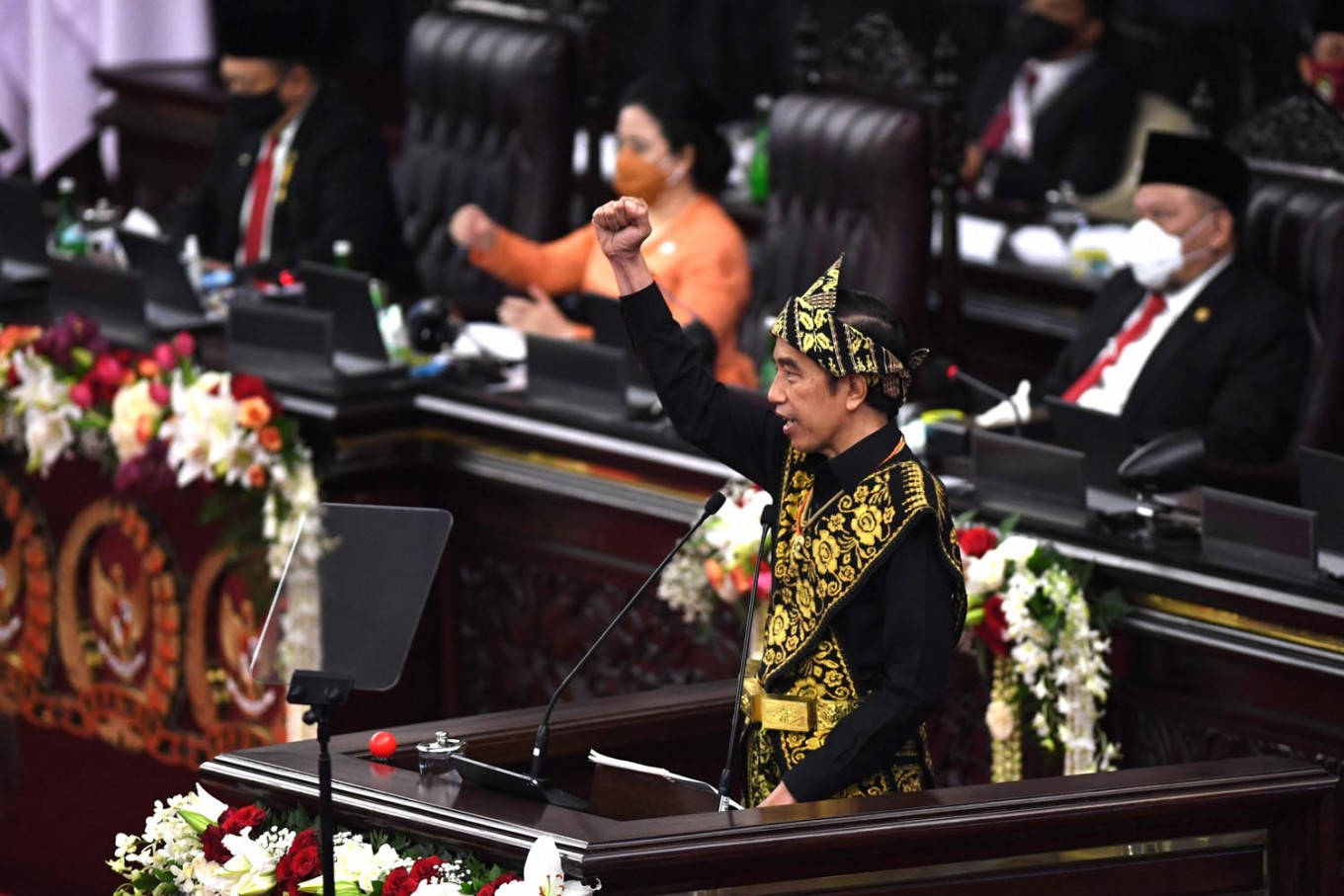Popular Reads
Top Results
Can't find what you're looking for?
View all search resultsPopular Reads
Top Results
Can't find what you're looking for?
View all search resultsJokowi seeks 'big leap' after pandemic
Change text size
Gift Premium Articles
to Anyone
W
rapped in the traditional black and golden garb of the people of East Nusa Tenggara, President Joko “Jokowi” Widodo made a big ask when he gave his annual state of the nation address in the chambers of the People’s Consultative Assembly in Jakarta on Friday.
He asked the people to support his massive development drive, even in the midst of an unfurling multidimensional crisis.
“Our current goal is not only to escape the pandemic but also to get through the crisis. We are taking measures to take a big leap by making the most of the ongoing crisis,” Jokowi said.
In his speech, held to commemorate Indonesia’s 75th Independence Day that falls on Monday, the President acknowledged that, like most countries in the world today, Indonesia was facing one of the worst economic crises in history, due to a pandemic that has killed nearly 800,000 people globally.
“In the first quarter of 2020, our economy grew by 2.97 percent, but in the second quarter, [it] contracted by 5.32 percent,” he said. “Developed [economies] even reported [contractions] of more than 10 percent.”
However, the former businessman encouraged the nation to embrace the setbacks and seize the moment to “catch up” with developed countries.
With his trademark use of analogies, the President compared the current crisis to a computer crash, and sought major transformation out of a crisis.
“All countries must undergo a brief shutdown, restart and reboot,” he said. “We must make the most of this crisis [...] We must make our country become the advanced Indonesia that we aspire for it to be.”
Faced with the task of keeping Southeast Asia’s largest economy afloat, Jokowi’s government had been in hot water for playing down the importance of public health in the interest of economic resilience.
The administration’s penchant for pro-development policymaking has also sparked criticism, including the lackadaisical support for causes championing the rights of minority and vulnerable groups.
The state of the nation address offered him a platform to redeem himself, even as critics continued to point out flaws in his government's work.
Jokowi's speech ran the gamut from giving assistance to micro, small and medium enterprises to upholding democratic values, from initiating structural reforms to shedding light on the specter of intolerance.
During the address, Jokowi expressed his appreciation to medical and health workers as well as to community leaders, volunteers, journalists, national security personnel and civil servants.
Jokowi pledged to formulate policies that protect human rights and the environment, noting that speed and accuracy should not be exchanged for “carelessness and arbitrariness”. “The law must be enforced without discrimination. The upholding of democratic values cannot be compromised. Democracy must continue without disrupting the speed of work and legal certainty, as well as the noble values of our nation,” he said.
To help keep people afloat in the midst of crisis, the President emphasized the need for swift action in providing social assistance for the poor and laid-off workers, while acknowledging the importance of loan restructuring and capital assistance for MSMEs.
However, SMERU Research Institute researchers pointed out that even for SMEs empowerment, there was still much to improve in the implementation of state assistance.
“The government's desire to ease the burden on MSMEs is hampered by the absence of a singular database. As long as this data is not available, targeting efforts to reach MSMEs’ [...] will be difficult to realize,” Palmira Permata Bachtiar, a senior researcher at SMERU, told The Jakarta Post on Friday.
On the issue of tolerance, Jokowi asserted that the commitment to democratic values "cannot be compromised" and that the people must not be “self-righteous and blame others”.
“No one should think of themselves as the most religious. No one should think of themselves as the most Pancasila-minded. All those feeling self-righteous and obtruding are not morally correct,” he said with regard to the state ideology.
The President had made no mention of such concerns during last year's address, which prompted criticism for overlooking discrimination and intolerance against the country’s religious minorities.
Firman Noor, head of the Indonesian Institute of Sciences’ (LIPI) Political Research Center, said Jokowi’s take on democracy and tolerance was still “quite normative”, even though the speech itself touched on many of the nation’s issues.
“He hasn’t addressed oligarchy. He highlighted tolerance in democracy, but he didn’t criticize how our democracy is still conquered by the oligarchy, that’s an undeniable fact,” Firman told the Post on Friday.
He also appeared to be responding to criticism over how his government had pressed ahead with the deliberation of controversial bills, including the omnibus bill on job creation. Critics of the bill say some provisions would dismantle the protection of workers and laws to protect the environment.
On Thursday, the National Commission on Human Rights (Komnas HAM) urged the President and the House of Representatives to stop the deliberation of the flagship legislation, saying it could violate human rights.










